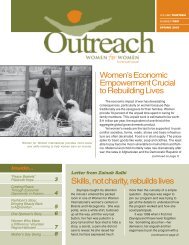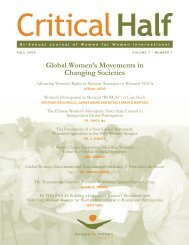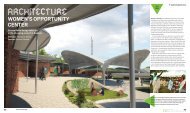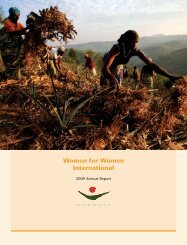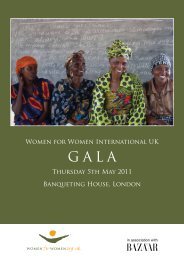Gender and Constitution Building - Women for Women International
Gender and Constitution Building - Women for Women International
Gender and Constitution Building - Women for Women International
You also want an ePaper? Increase the reach of your titles
YUMPU automatically turns print PDFs into web optimized ePapers that Google loves.
Reflections from the Board of Editors<br />
onstitution-building in post-conflict societies<br />
can be an important part of the transition to<br />
Coften<br />
peaceful coexistence. While the peace process<br />
deals with issues of reconstruction <strong>and</strong> the modalities<br />
of new governance, it also provides opportunities<br />
<strong>for</strong> truth <strong>and</strong> reconciliation <strong>and</strong> the interjection<br />
<strong>and</strong> recognition of new rights, such as gender equality,<br />
disability rights <strong>and</strong> the special needs <strong>and</strong> rights of children<br />
<strong>and</strong> the elderly. It can be a stepping stone toward<br />
greater equity <strong>and</strong> fairness in societies that have been<br />
divided socially, economically <strong>and</strong> politically <strong>and</strong> where<br />
internal groups have been at war with one another. The<br />
transition creates possibilities to develop a trans<strong>for</strong>mational<br />
framework <strong>for</strong> society to move toward justice,<br />
equality <strong>and</strong> democracy <strong>and</strong> to provide opportunities<br />
<strong>for</strong> the development of those previously excluded from<br />
the benefits in society. The transition also provides possibilities<br />
<strong>for</strong> women to push open new doors to political<br />
<strong>and</strong> economic participation <strong>and</strong> to make constitutional<br />
gains that can be stored up <strong>for</strong> more substantive<br />
gains in the future.<br />
But transitions are also times when reconstruction<br />
can be a euphemism <strong>for</strong> reinventing patterns of patriarchal<br />
<strong>and</strong> elite control over society. Both the possibilities<br />
<strong>and</strong> the dangers present strategic challenges <strong>for</strong><br />
feminist <strong>and</strong> gender activists. A danger in “rights” talk<br />
is that tradition might trump more democratic ways of<br />
doing things. This seemed the case in South Africa’s<br />
negotiations <strong>for</strong> a democratic <strong>Constitution</strong> in 1993-<br />
1994. The traditional chiefs tried to get the ANC to<br />
agree that customary law should not be tampered with<br />
by the new democratic <strong>Constitution</strong>. Customary law<br />
defined women as minors in law – thus the traditional<br />
leaders sought to perpetuate the control of men over<br />
women. Fortunately, women were well-organized in a<br />
diverse range of organizations in South Africa <strong>and</strong><br />
<strong>for</strong>med a cross-party coalition that vigilantly monitored<br />
the negotiations <strong>and</strong> prevented the ANC from compromising<br />
women’s equal citizenship claims. The<br />
<strong>Women</strong>’s National Coalition demonstrated <strong>and</strong> lobbied,<br />
held media conferences <strong>and</strong> appeared on television<br />
challenging the negotiators to dare to tamper with<br />
women’s rights. The first lesson of transition that we<br />
learned in South Africa was the imperative <strong>for</strong> women<br />
to be well-organized <strong>and</strong> to vigilantly monitor peace<br />
<strong>and</strong> constitutional processes.<br />
There is a danger, also, that the peace talks <strong>and</strong><br />
constitution-building between elites <strong>and</strong> leadership cadres<br />
simply papers over the fault-lines of division in<br />
societies exhausted but still replete with the pain <strong>and</strong><br />
bitterness of the aftermath of civil strife. Even Truth<br />
<strong>and</strong> Reconciliation Commissions can silence the experience<br />
of women unless there is a concerted ef<strong>for</strong>t<br />
to underst<strong>and</strong> the differentiated experience of women<br />
<strong>and</strong> men during war <strong>and</strong> civil war. In South Africa, the<br />
TRC did not confront this reality until a small coalition<br />
of gender activists lobbied to ensure that the<br />
gendered nature of apartheid be brought to the surface.<br />
The process was in fact inadequate, as the final<br />
TRC report did not integrate women’s experience, but<br />
instead merely provided a chapter on human rights<br />
violations against women. <strong>Women</strong>’s experience is not<br />
a discrete chapter, but germane <strong>and</strong> central to the history<br />
of society. Thus, the cautionary lesson from South<br />
Africa is that we have to struggle to ensure that women’s<br />
stories are not marginalized, but are understood as part<br />
of the power relations of society that define women<br />
as secondary <strong>and</strong> keep them subordinate in a multitude<br />
of different ways.<br />
In South Africa, the coming to power of a social,<br />
democratic regime has not been the panacea that<br />
women may have hoped <strong>for</strong>. While legislation has been<br />
progressive, the actual implementation has been<br />
strangled by lack of resources. The realization is that<br />
even progressive states cannot be left to carve out<br />
society’s future without the full integration of an<br />
agenda that promotes the trans<strong>for</strong>mation of gender<br />
relations—this requires more than institutional mechanisms.<br />
Trans<strong>for</strong>mation requires that women <strong>and</strong> men<br />
take on the feminist agenda of promoting a non-sexist<br />
culture. It requires civil society to play a central role<br />
in driving change. So the final lesson <strong>for</strong> all of us is<br />
that the feminist struggle <strong>for</strong> trans<strong>for</strong>mation is still at<br />
its beginning as we move into the era of peace. Transitions<br />
are important moments <strong>for</strong> women to organize,<br />
but after the elections is when the real work, the<br />
struggle <strong>for</strong> trans<strong>for</strong>mation, really begins. We can never<br />
rest on our laurels.<br />
Dr. Sheila Meintjes<br />
Department of Political Studies,<br />
University of the Witwatersr<strong>and</strong>, South Africa<br />
CRITICAL HALF 5



